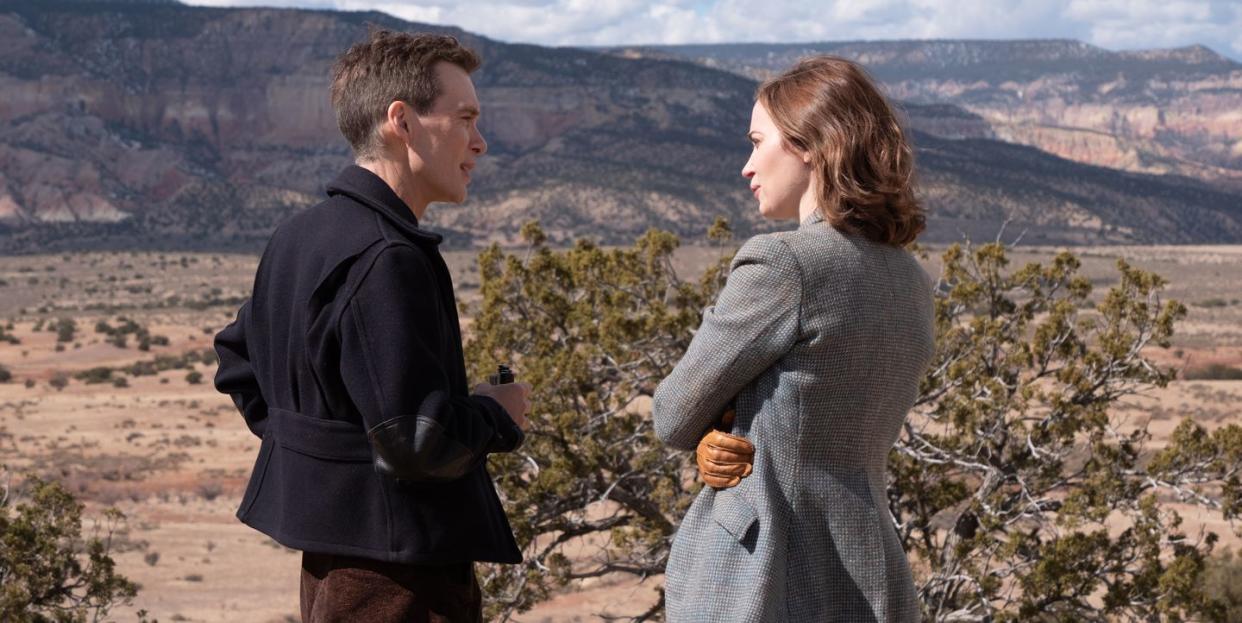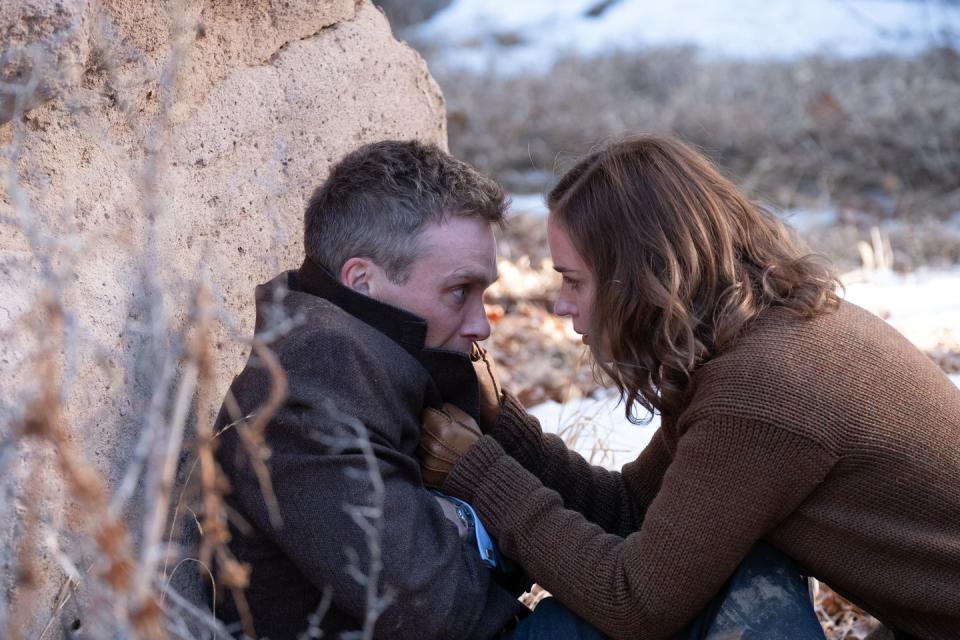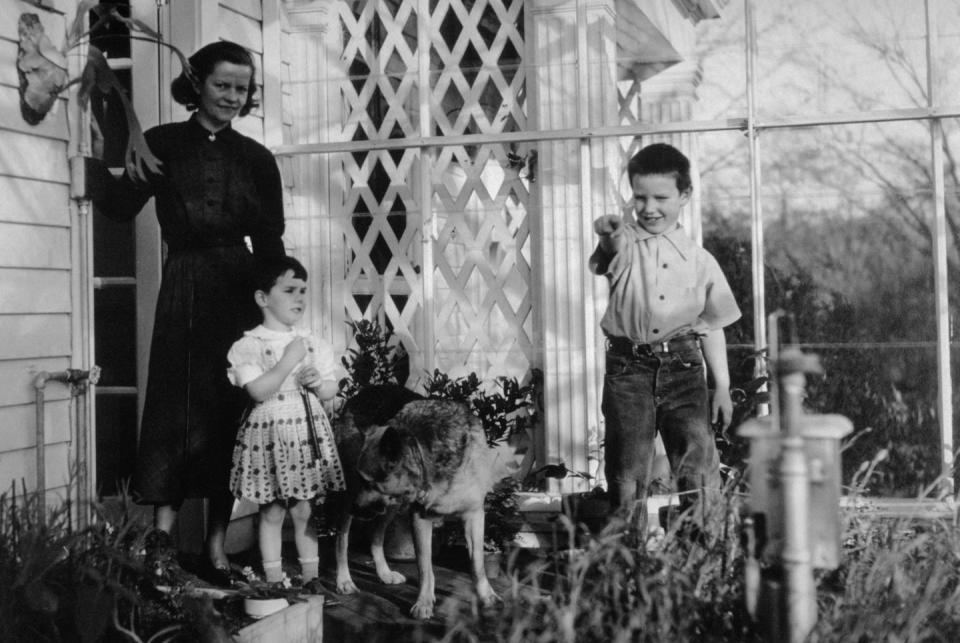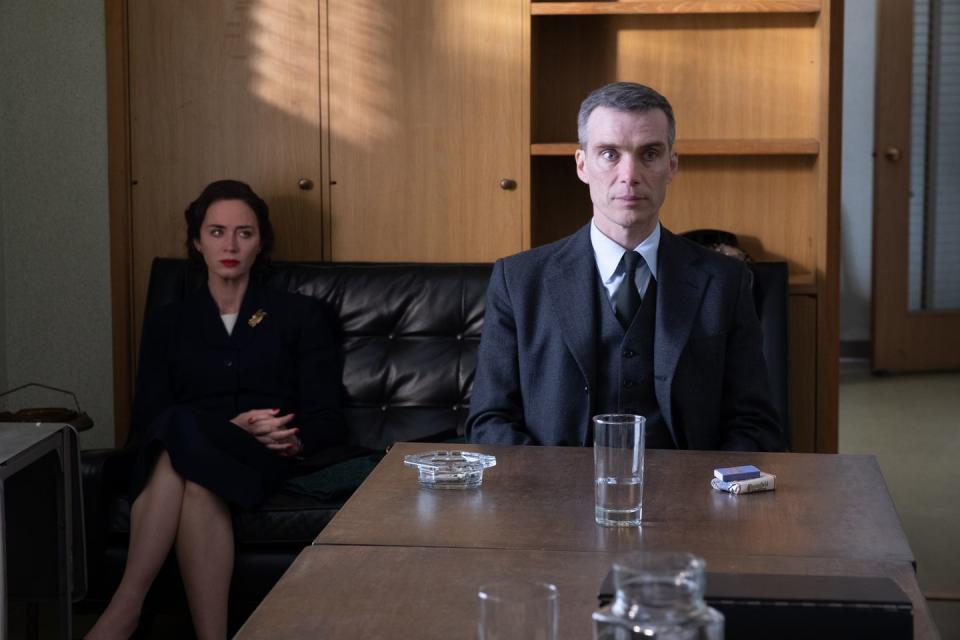Kitty Oppenheimer Really Did Stand Up for Her Husband at His Security Hearings

J. Robert Oppenheimer is the tortured genius at the center of Christopher Nolan’s latest film, but the people in his orbit also come into focus. One of them is his wife, Katherine, who remained by his side through his time directing the Manhattan Project in Los Alamos and the brutal security hearings that critiqued his communist associations and past work. Played by Emily Blunt in Oppenheimer opposite Cillian Murphy, “Kitty” was also interested in the sciences, was involved with the Communist Party, and was one her husband’s staunchest defenders. Here’s what else to know.
She was a botanist.
Kitty was born Katherine Puening in Germany and grew up in Pittsburgh. The daughter of an engineer, she had a privileged upbringing in a wealthy suburb. (And was even believed to be distantly related to royalty.)
She also had quite an eclectic educational background, attending the University of Pittsburgh, University of Munich, Sorbonne University, University of Grenoble, and, later, the University of Pennsylvania, where she earned her degree with honors in botany. She also pursued graduate studies at UCLA, according to Kai Bird and Martin J. Sherwin’s book American Prometheus: The Triumph and Tragedy of J. Robert Oppenheimer (the source material for Nolan’s film).
Kitty’s interest in botany continued later in life, as she kept a garden in Princeton, New Jersey, where she lived, according to her New York Times obituary.

She met Oppenheimer after a few failed marriages.
Oppenheimer saw a number of women after his relationship with Jean Tatlock died down, but he met Kitty in 1939 at a garden party in Pasadena, according to American Prometheus. She was just about to start her graduate studies at UCLA.
By then, Kitty had already technically been married three times. The first was to musician Frank Ramseyer, whom she met in Paris. Their union was annulled only a few months later, and she rarely acknowledged this as her first marriage. The second was to Joseph Dallet, a communist organizer, who died in 1937 fighting for the Spanish Civil War. The third was to doctor Richard Harrison, whom she divorced to marry Oppenheimer in 1940.
When she and Oppenheimer started dating months after their first meeting, she was still married to Harrison. In 1940, Oppenheimer even invited the couple up to spend the summer at his ranch in Perro Caliente with his friends. Only Kitty could attend, and she stayed two months. At the end of the summer, she was pregnant, and it was Oppenheimer who broke the news to Kitty’s husband. They agreed that Harrison would divorce her so Oppenheimer could remarry her. “It was all very civilized,” Bird and Sherwin wrote. The new couple married in Virginia City, Nevada the day Kitty’s divorce was finalized. They lived in Pasadena, California before moving to Los Alamos in New Mexico, where Oppenheimer worked on the Manhattan Project.

Kitty still studied throughout her pregnancy and kept her ambitions of becoming a botanist. But she was a bit overwhelmed by motherhood. In 1941, after welcoming their firstborn, Peter, Oppenheimer asked Haakon Chevalier and his wife, who were close friends, to take care of the boy while he and Kitty spent time away. They stayed at Perro Caliente for two months, often riding horses, as depicted in the film.
During their time at Los Alamos, Kitty didn’t want to be restricted to a traditional wife role. She worked part-time as a lab technician under Dr. Hempelmann, who studied the health hazards of radiation, but quit after a year. She still had her own career ambitions and “felt increasingly trapped” and “stymied professionally,” Bird and Sherwin wrote. Living in the isolated Los Alamos didn’t help. She felt similarly years later at Princeton, where her husband was director of the Institute for Advanced Study. There, Kitty felt pressured to “play the role of ‘director’s wife’” and “was like a tigress caged,” report Bird and Sherwin. On December 7, 1944, she welcomed their second child, a daughter named Katherine, in Los Alamos.
Kitty was intelligent, but known to have a sharp tongue. However, she and her husband leaned on each other. “Her career was advancing Robert’s career, which was the overwhelming, controlling influence on her from then on,” Oppenheimer’s collaborator and friend Robert Serber said, per American Prometheus. Verna Hobson, Kitty’s friend and Oppenheimer’s former secretary, also said in the book, “She was Robert’s greatest confidante and advisor. He told her everything. … He leaned on her tremendously,”
She struggled with alcoholism.
Bird and Sherwin report that Kitty “had a fair share of martinis” at Los Alamos, but, by the time she and Robert moved to Princeton, her drinking worsened. Hobson recalled, “She would get drunk sometimes to the point of falling down and not making much sense. Sometimes she passed out. But so many times I have seen her pull herself together when you didn’t believe she possibly could.”
On the contrary, Serber insisted years later that Kitty’s drunken appearance was the result of her taking strong sedatives for her pancreatitis. He said she “never drank excessively for a normal person.” Friends of the couple noticed that Oppenheimer was passive about Kitty’s drinking.
She was questioned about her communist background, but firmly stood her ground.
Kitty Oppenheimer was introduced to communism through her previous husband Joseph Dallet. At first, she was only allowed to join the Young Communist League, a membership she earned after handing out copies of the Daily Worker, according to American Prometheus. She paid dues and met other members of the party through Dallet. She went on to serve as the party’s “literary agent” in 1935. She even attended a protest in Paris of the West’s neutrality to the Spanish Civil War.
These activities would later come back to haunt her and her husband, especially in the ’50s, during his security hearing by the United States Atomic Energy Commission. In one of the most gripping scenes of Oppenheimer, Kitty (played fiercely by Blunt) puts on a remarkable show, facing her interrogators with great tenacity, when she’s called in as a witness. Turns out, that’s not too different from how her real-life testimonies went down. Many of her lines in those scenes were taken right from the transcript of the hearings.
Despite being nervous, as Kitty later revealed to a friend, she appeared composed and unflappable. Bird and Sherwin write, “She acquitted herself easily, coolly and precisely answering each question.” And she appeared “forthright and unflustered,” probably a result of her parents teaching her strict discipline as a child.
When asked about the distinction between members of the Communist Party of America and the Communist Soviet Union, Kitty said, per a transcript: “There are two answers to that as far as I’m concerned. In the days that I was a member of the Communist Party and our country had its Communist Party. I thought that the Communist Party of the United States was concerned with problems internal. I now no longer believe this. I believe the whole thing is linked together and spread all over the world.”
When she was called in again, Kitty reiterated that she had left the party and continued to stand up for her husband. “Kitty did not give an inch,” Bird and Sherwin wrote. “Not even [Roger] Robb [the attorney cross-examining at the hearing] could touch her. Calm and yet alert to every nuance, she was undoubtedly a better witness than the husband she was defending.”

She died in 1978 at the age of 62.
J. Robert Oppenheimer died in 1967 in Princeton, at age 62, after battling throat cancer. His wife spread his ashes at their home at St. John in the Virgin Islands. She later moved in with their longtime friend Robert Serber. Kitty died in 1978, also at age 62, at a hospital in Ancon, Panama following an intestinal infection and embolism in her right arm, per the NYT.
At the time of her death, she was a captain of her yacht, the Moonraker, having just completed a tour of the Caribbean. She and the crew were planning to sail to Japan, passing through the Panama Canal. She was survived by her and Robert’s two children, Peter and Katherine.
You Might Also Like


